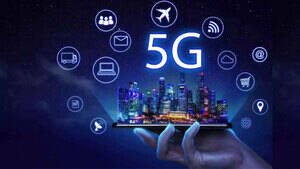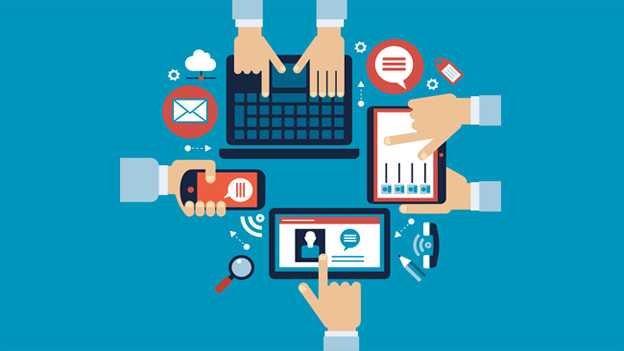Benefits from 5G technology and Impacts on Society
5G technology represents a leap forward in our quest for faster, more reliable, and more efficient connectivity.

In an age where connectivity has become an integral part of our daily lives, the advent of 5G technology is poised to usher in a new era of communication and innovation.
5G, the fifth generation of wireless technology, promises to deliver faster speeds, lower latency, and greater reliability than its predecessors.
As we delve deeper into the world of 5G, we'll explore its core concepts, the technologies behind it, and the potential impact it could have on society.
Understanding the 5G Technology
At its core, 5G stands for the fifth generation of wireless technology. It is the successor to 4G, which has been the standard for mobile communication for the past decade.
The primary goal of 5G is to provide significantly faster data speeds and lower latency compared to previous generations. Here's a breakdown of the key components that make 5G technology unique:
1. Faster Speeds: 5G is expected to offer blazing-fast download and upload speeds. While 4G can provide speeds of up to 100 Mbps, 5G promises to deliver speeds in the range of 1 Gbps (gigabit per second) and beyond. This exponential increase in speed opens up new possibilities for streaming high-quality content, gaming, and other data-intensive applications.
2. Low Latency: Latency refers to the delay between sending a command and receiving a response. 5G technology aims to achieve ultra-low latency, reducing it to as little as 1 millisecond (ms). This is a game-changer for applications like virtual reality (VR), augmented reality (AR), and autonomous vehicles, where split-second decisions are crucial.
3. Massive Connectivity: 5G is designed to support a massive number of devices simultaneously. With the Internet of Things (IoT) becoming more prevalent, this feature is essential for connecting the ever-expanding network of smart devices seamlessly.
4. Improved Reliability: 5G networks are built to be highly reliable. They can automatically reroute traffic in case of network congestion or failures, ensuring that users experience minimal disruptions.
5. Enhanced Spectrum: Unlike previous generations, 5G utilizes a broader spectrum of frequencies, including higher frequencies in the millimeter wave (mmWave) range. This spectrum diversity enables 5G to offer higher speeds and capacity.
The Technologies Behind 5G Technology
To achieve these remarkable capabilities, 5G relies on several cutting-edge technologies:
1. Millimeter Waves: As mentioned earlier, 5G operates in the millimeter wave spectrum, which offers a wider bandwidth for faster data transmission. However, these high-frequency waves have shorter range and can be easily blocked by obstacles, requiring more infrastructure like small cell towers.
2. Small Cells: To overcome the limitations of millimeter waves, 5G networks deploy small cell towers in urban areas. These compact cells work together to provide seamless connectivity, even in densely populated areas.
3. Massive MIMO (Multiple-Input Multiple-Output): Massive MIMO technology uses a large number of antennas on base stations and devices to increase network capacity and improve signal quality.
4. Beamforming: Beamforming is a technique where the signal from a base station is focused directly on the user's device. This not only increases signal strength but also reduces interference.
5. Network Slicing: Network slicing allows 5G networks to be divided into multiple virtual networks, each tailored to specific applications or user groups. This ensures that critical applications receive the necessary resources and prioritization.
The Potential Impact on Society
The rollout of 5G technology is not just about faster download speeds or smoother streaming. It has the potential to transform various aspects of society in profound ways. Here are some areas where 5G is expected to make a significant impact:
1. Healthcare: Telemedicine is already on the rise, but with 5G's low latency and high bandwidth, doctors can perform remote surgeries with precision, and patients can receive real-time medical consultations through AR and VR technologies.
2. Education: 5G can revolutionize education by enabling immersive virtual classrooms, interactive remote learning, and instant access to educational resources for students in remote areas.
3. Smart Cities: 5G is the backbone of smart city initiatives. It will power everything from smart traffic management and energy-efficient lighting to waste management systems that optimize collection routes.
4. Autonomous Vehicles: Self-driving cars rely on ultra-fast, low-latency communication. 5G networks can provide the connectivity needed for safe and efficient autonomous transportation.
5. Manufacturing: The manufacturing industry can benefit from 5G's low latency and reliability by enabling remote monitoring and control of machinery, as well as the implementation of AI-powered predictive maintenance.
6. Entertainment and Gaming: Consumers will experience seamless 4K and 8K streaming, augmented reality gaming, and virtual reality experiences that were previously unimaginable.
7. IoT and Smart Devices: 5G's ability to handle a massive number of connected devices will lead to the proliferation of smart home appliances, wearables, and industrial IoT applications.
8. Environmental Impact: By optimizing resource usage in various sectors, 5G can contribute to a more sustainable future by reducing energy consumption and carbon emissions.
Challenges and Concerns
While the potential benefits of 5G are vast, there are also challenges and concerns that need to be addressed:
1. Infrastructure: The deployment of 5G requires significant infrastructure investment, including the installation of small cell towers and upgrading existing networks. This can be costly and time-consuming.
2. Security: With more devices connected to 5G networks, the attack surface for cyber threats increases. Ensuring the security of these networks and devices is paramount.
3. Privacy: The massive amount of data generated by 5G-connected devices raises concerns about data privacy and how this information will be used.
4. Digital Divide: Access to 5G technology may not be equitable, leading to a digital divide between urban and rural areas or economically disadvantaged communities.
5G technology represents a leap forward in our quest for faster, more reliable, and more efficient connectivity. Its potential impact on society is vast, touching almost every aspect of our lives, from healthcare and education to entertainment and transportation.
While there are challenges to overcome, the promise of 5G is too great to ignore. As we move further into the 5G era, we must work together to ensure that its benefits are accessible to all and that the technology is used responsibly and securely.
The 5G revolution has arrived, and it's up to us to harness its full potential for the betterment of society.
What's Your Reaction?














